Search Results
Showing results 241 to 260 of 528

Bernoulli Levitator
Source Institutions
Demonstrate the Bernoulli Principle using simple materials on a small or large scale.
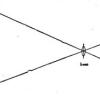
Bring it into Focus
Source Institutions
In this activity (page 2 of PDF), learners play with a lens and a piece of paper to focus an image on the paper. Learners look at different things, and see how the lenses affect the image.
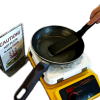
Shrinkers
Source Institutions
In this hands-on activity, learners use heat to shrink samples of polystyrene plastic (#6 recycle code). Learners compare the size and shape of the plastic pieces before and after shrinking.

Paper Drop Design Competition
Source Institutions
Using paper, paper clips, an index card, and tape, teams of learners design flying devices to (1) stay in the air as long as possible and (2) land as close as possible to a given target.
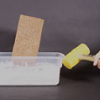
Earthquake Science: Soil Liquefaction
Source Institutions
This activity demonstrates liquefaction, the process by which some soils lose their solidity during an earthquake.

Help Wanted
Source Institutions
In this interactive board game, learners "hire" different types of scientists to help canine character Ruff Ruffman solve unusual problems.

Fill 'er Up!
Source Institutions
Learners discover that their breath contains carbon dioxide, one of the pollutants found in car exhaust.
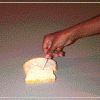
Try Growing Your Own Mold
Source Institutions
This is a hands-on activity that uses bread and household materials to grow mold. Learners collect dust from a room, wipe it on food, and contain it. One to seven days later, mold has grown.

Heat Capacity: Can't Take the Heat?
Source Institutions
Why is ocean water sometimes the warmest when the average daily air temperature starts to drop? In this activity, learners explore the differing heat capacities of water and air using real data.
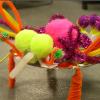
Jitterbug
Source Institutions
This activity explores the concept of center of gravity by having learners build a Jitterbug--a motorized toy that seems to dance--using a recycled CD and a DC motor.

Bubble Bomb
Source Institutions
Learn about chemical reactions by making a Bubble Bomb, a plastic bag you can pop with the power of fizz.
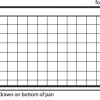
Dispersing Dispersion
Source Institutions
In this activity, learners investigate the movement caused by dispersion. Learners discover that dispersion is the random movement of objects.
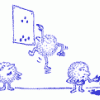
Look Mom, No Wings!
Source Institutions
In this activity about flight, learners explore how high they can jump. Learners dip their finger in ink or dirt, then jump as high as they can and mark paper attached to the wall.

Soggy Science, Shaken Beans
Source Institutions
Learners explore soybeans, soak them in water to remove their coat, and then split them open to look inside. They also make a musical shaker out of paper cups, a cardboard tube, and soybeans.

Dissolving a Substance in Different Liquids
Source Institutions
In this activity, learners make colored sugar and add it to water, alcohol, and oil to discover some interesting differences in dissolving.

Habitable Worlds
Source Institutions
In this group activity, learners consider environmental conditions—temperature, presence of water, atmosphere, sunlight, and chemical composition—on planets and moons in our solar system to determine
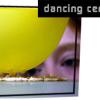
Dancing Cereal
Source Institutions
In this quick activity (on page 2 of the PDF under GPS: Body Electricity Activity), learners will observe how dry breakfast cereal appears to dance when it gets close to a balloon charged with static
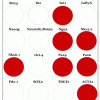
Microarrays and Stem Cells
Source Institutions
In this activity, learners use microarray technology to determine which genes are turned on and off at various points in the differentiation of pluripotent stem cells on their way to becoming pancreat

Hot Stuff!: Investigation #3
Learners test two jars of ice water, one covered and one open, for changes in temperature. After placing the jars in the sun, learners discover that the covered jar cools down more slowly.
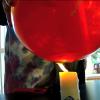
Do Sweat It!
Source Institutions
In this activity, learners explore why humans sweat. Learners compare the effects of heat on a balloon filled with air and a balloon filled water.
